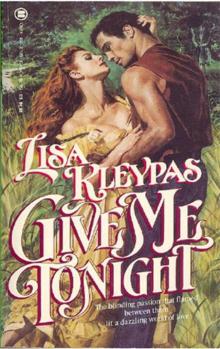- Home
- Lisa Kleypas
Love in the Afternoon Page 2
Love in the Afternoon Read online
Page 2
Families are grieving for the lives I’ve taken. Sons, brothers, fathers. I’ve earned a place in hell for the things I’ve done, and the war’s barely started. I’m changing, and not for the better. The man you knew is gone for good, and I fear you may not like his replacement nearly so well.
The smell of death, Pru . . . it’s everywhere.
The battlefield is strewn with pieces of bodies, clothes, soles of boots. Imagine an explosion that could tear the soles from your shoes. They say that after a battle, wildlflowers are more abundant the next season—the ground is so churned and torn, it gives the new seeds room to take root. I want to grieve, but there is no place for it. No time. I have to put the feelings away somewhere.
Is there still some peaceful place in the world? Please write to me. Tell me about some bit of needlework you’re working on, or your favorite song. Is it raining in Stony Cross? Have the leaves begun to change color?
Yours,
Christopher Phelan
By the time Beatrix had finished the letter, she was aware of a peculiar feeling, a sense of surprised compassion pressing against the walls of her heart.
It didn’t seem possible that such a letter could have come from the arrogant Christopher Phelan. It wasn’t at all what she had expected. There was a vulnerability, a quiet need, that had touched her.
“You must write to him, Pru,” she said, closing the letter with far more care than she had previously handled it.
“I’ll do no such thing. That would only encourage more complaining. I’ll be silent, and perhaps that will spur him to write something more cheerful next time.”
Beatrix frowned. “As you know, I have no great liking for Captain Phelan, but this letter . . . he deserves your sympathy, Pru. Just write him a few lines. A few words of comfort. It would take no time at all. And about the dog, I have some advice—”
“I am not writing anything about the dratted dog.” Prudence gave an impatient sigh. “You write to him.”
“Me? He doesn’t want to hear from me. He thinks I’m peculiar.”
“I can’t imagine why. Just because you brought Medusa to the picnic . . .”
“She’s a very well behaved hedgehog,” Beatrix said defensively.
“The gentleman whose hand was pierced didn’t seem to think so.”
“That was only because he tried to handle her incorrectly. When you pick up a hedgehog—”
“No, there’s no use telling me, since I’m never going to handle one. As for Captain Phelan . . . if you feel that strongly about it, write a response and sign my name.”
“Won’t he recognize that the handwriting is different?”
“No, because I haven’t written to him yet.”
“But he’s not my suitor,” Beatrix protested. “I don’t know anything about him.”
“You know as much as I do, actually. You’re acquainted with his family, and you’re very close to his sister-in-law. And I wouldn’t say that Captain Phelan is my suitor, either. At least not my only one. I certainly won’t promise to marry him until he comes back from the war with all his limbs intact. I don’t want a husband I would have to push around in an invalid’s chair for the rest of my life.”
“Pru, you have the depth of a puddle.”
Prudence grinned. “At least I’m honest.”
Beatrix gave her a dubious glance. “You’re actually delegating the writing of a love letter to one of your friends?”
Prudence waved her hand in a dismissive gesture. “Not a love letter. There was nothing of love in his letter to me. Just write something cheerful and encouraging.”
Beatrix fumbled for the pocket of her walking dress, and tucked the letter inside. Inwardly she argued with herself, reflecting that it never ended well when one did something morally questionable for the right reasons. On the other hand . . . she couldn’t rid herself of the image her mind had conjured, of an exhausted soldier scribbling a hasty letter in the privacy of his tent, his hands blistered from digging the graves of his comrades. And a ragged dog whining in the corner.
She felt entirely inadequate to the task of writing to him. And she suspected that Prudence did as well.
She tried to imagine what it was like for Christopher, leaving his elegant life behind, finding himself in a world where his survival was threatened day by day. Minute by minute. It was impossible to picture a spoiled, beautiful man like Christopher Phelan contending with danger and hardship. Hunger. Loneliness.
Beatrix stared at her friend pensively, their gazes meeting in the looking glass. “What is your favorite song, Pru?”
“I don’t have one, actually. Tell him yours.”
“Should we discuss this with Audrey?” Beatrix asked, referring to Phelan’s sister-in-law.
“Certainly not. Audrey has a problem with honesty. She wouldn’t send the letter if she knew I hadn’t written it.”
Beatrix made a sound that could have either been a laugh or a groan. “I wouldn’t call that a problem with honesty. Oh, Pru, please change your mind and write to him. It would be so much easier.”
But Prudence, when pressed to do something, usually turned intransigent, and this situation was no exception. “Easier for everyone but me,” she said tartly. “I’m sure I don’t know how to reply to such a letter. He’s probably even forgotten that he’s written it.” Returning her attention to the looking glass, she applied a touch of rose-petal salve to her lips.
How lovely Prudence was, with her heart-shaped face, her brows thin and delicately arched over round green eyes. But how very little of a person the looking glass reflected. It was impossible to guess what Prudence truly felt for Christopher Phelan. Only one thing was certain: it was better to answer, no matter how ineptly, than to withhold a reply. Because sometimes silence could wound someone nearly as badly as a bullet.
In the privacy of her room at Ramsay House, Beatrix sat at her desk and dipped a pen nib into a well of dark blue ink. A three-legged gray cat named Lucky lounged at the corner of the desk, watching her alertly. Beatrix’s pet hedgehog, Medusa, occupied the other side of the desk. Lucky, being an innately sensible creature, never bothered the bristly little hedgehog.
After consulting the letter from Phelan, Beatrix wrote:
Captain Christopher Phelan
1st Battalion Rifle Brigade
2nd Division Camp, Crimea
17 October 1854
Pausing, Beatrix reached out to stroke Lucky’s remaining front paw with a gentle fingertip. “How would Pru start a letter?” she wondered aloud. “Would she call him darling? Dearest?” She wrinkled her nose at the idea.
The writing of letters was hardly Beatrix’s forte. Although she came from a highly articulate family, she had always valued instinct and action more than words. In fact, she could learn far more about a person during a short walk outdoors than she could by sitting and conversing for hours.
After pondering various things one might write to a complete stranger while masquerading as someone else, Beatrix finally gave up. “Hang it, I’ll just write as I please. He’ll probably be too battle weary to notice that the letter doesn’t sound like Pru.”
Lucky settled her chin beside her paw and half closed her eyes. A purring sigh escaped her.
Beatrix began to write.
Dear Christopher,
I have been reading the reports about the battle of the Alma. According to the account by Mr. Russell of the Times, you and two others of the Rifle Brigade went ahead of the Coldstream Guards, and shot several enemy officers, thereby disordering their columns. Mr. Russell also remarked in admiration that the Rifles never retreated or even bobbed their heads when the bullets came flying.
While I share his esteem, dear sir, I wish to advise that in my opinion it would not detract from your bravery to bob your head when being shot at. Duck, dodge, sidestep, or preferably hide behind a rock. I promise I won’t think the less of you!
Is Albert still with you? Still biting? According to my friend Beatrix (she wh
o brings hedgehogs to picnics), the dog is overstimulated and afraid. As dogs are wolves at heart and require a leader, you must establish dominance over him. Whenever he tries to bite you, take his entire muzzle in your hand, apply light pressure, and tell him “no” in a firm voice.
My favorite song is “Over the Hills and Far Away.” It rained in Hampshire yesterday, a soft autumn storm that brought down hardly any leaves. The dahlias are no longer in stem, and frost has withered the chrysanthemums, but the air smells divine, like old leaves and wet bark, and ripe apples. Have you ever noticed that each month has its own smell? May and October are the nicest-smelling months, in my opinion.
You ask if there is a peaceful place in the world, and I regret to say that it is not Stony Cross. Recently Mr. Mawdsley’s donkey escaped from his stall, raced down the road, and somehow found his way into an enclosed pasture. Mr. Caird’s prized mare was innocently grazing when the ill-bred seducer had his way with her. Now it appears the mare has conceived, and a feud is raging between Caird, who demands financial compensation, and Mawdsley, who insists that had the pasture fencing been in better repair, the clandestine meeting would never have occurred. Worse still, it has been suggested that the mare is a shameless lightskirt and did not try nearly hard enough to preserve her virtue.
Do you really think you’ve earned a place in hell? . . . I don’t believe in hell, at least not in the afterlife. I think hell is brought about by man right here on earth.
You say the gentleman I knew has been replaced. How I wish I could offer better comfort than to say that no matter how you have changed, you will be welcomed when you return. Do what you must. If it helps you to endure, put the feelings away for now, and lock the door. Perhaps someday we’ll air them out together.
Sincerely,
Prudence
Beatrix had never intentionally deceived anyone. She would have felt infinitely more comfortable writing to Phelan as herself. But she still remembered the disparaging remarks that he had once made about her. He would not want a letter from that “peculiar Beatrix Hathaway.” He had asked for a letter from the beautiful golden-haired Prudence Mercer. And wasn’t a letter written under false pretenses better than nothing at all? A man in Christopher’s situation needed all the words of encouragement one could offer.
He needed to know that someone cared.
And for some reason, after having read his letter, Beatrix found that she did indeed care.
Chapter Two
The harvest moon brought dry, clear weather, and the Ramsay tenants and workers reaped the most abundant yields in memory. Like everyone else on the estate, Beatrix was occupied with the harvest and the local festival that followed. A massive al fresco dinner and dance was held on the grounds of Ramsay House for more than a thousand guests, including tenants, servants, and townspeople.
To Beatrix’s disappointment, Audrey Phelan had not been able to attend the festivities, as her husband John had developed a persistent cough. She had stayed home to care for him. “The doctor has left us with some medicine that has already helped John to great effect,” Audrey had written, “but he warned that uninterrupted bed rest is important for a complete recovery.”
Near the end of November, Beatrix walked to the Phelans’ house, taking a direct route through woodlands populated with gnarled oak and wide-gesturing beeches. The dark-branched trees seemed to have been dipped in crushed sugar. As the sun cracked through the veneer of clouds, it struck brilliant glints on the frost. The soles of Beatrix’s sturdy shoes bit through the frozen mush of dried leaves and moss.
She approached the Phelan house, formerly a royal hunting lodge, a large ivy-covered home set among ten forested acres. Reaching a charming paved path, Beatrix skirted the side of the house and headed toward the front.
“Beatrix.”
Hearing a quiet voice, she turned to behold Audrey Phelan sitting alone on a stone bench.
“Oh, hello,” Beatrix said cheerfully. “I hadn’t seen you in days, so I thought I would . . .” Her voice faded as she took a closer look at her friend.
Audrey was wearing a simple day gown, the gray fabric blending into the woods behind her. She had been so silent and still that Beatrix hadn’t even noticed her.
They had been friends for three years, ever since Audrey had married John and moved to Stony Cross. There was a certain kind of friend one only visited when one had no problems—that was Prudence. But there was another kind of friend one went to in times of trouble or need—that was Audrey.
Beatrix frowned as she saw that Audrey’s complexion was bleached of its usual healthy color, and her eyes and nose were red and sore-looking.
Beatrix frowned in concern. “You’re not wearing a cloak or shawl.”
“I’m fine,” Audrey murmured, even though her shoulders were trembling. She shook her head and made a staying gesture as Beatrix took off her heavy wool cloak and went to drape it over Audrey’s slender form. “No, Bea, don’t—”
“I’m warm from the exertion of the walk,” Beatrix insisted. She sat beside her friend on the icy stone bench. A wordless moment passed, while Audrey’s throat worked visibly. Something was seriously wrong. Beatrix waited with forced patience, her heartbeat in her throat. “Audrey,” she finally asked, “has something happened to Captain Phelan?”
Audrey responded with a blank stare, as if she were trying to decipher a foreign language. “Captain Phelan,” she repeated quietly, and gave a little shake of her head. “No, as far as we know, Christopher is well. In fact, a packet of letters arrived from him yesterday. One of them is for Prudence.”
Beatrix was nearly overcome with relief. “I’ll take it to her, if you like,” she volunteered, trying to sound diffident.
“Yes. That would be helpful.” Audrey’s pale fingers twisted in her lap, knotting and unknotting.
Slowly Beatrix reached out and put her hand over Audrey’s. “Your husband’s cough is worse?”
“The doctor left earlier.” Taking a deep breath, Audrey said dazedly, “John has consumption.”
Beatrix’s hand tightened.
They were both silent, while a chilling wind crackled the trees.
The enormity of the unfairness was difficult to grasp. John Phelan was a decent man, always the first to call on someone when he had heard they needed help. He had paid for a cottager’s wife to have medical treatment that the couple couldn’t afford, and had made the piano in his home available for local children to take lessons, and invested in the rebuilding of the Stony Cross pie shop when it had nearly burned to the ground. And he did it all with great discretion, seeming almost embarrassed to be caught in a good deed. Why did someone like John have to be stricken?
“It’s not a death sentence,” Beatrix eventually said. “Some people survive it.”
“One in five,” Audrey agreed dully.
“Your husband is young and strong. And someone has to be the one out of the five. It will be John.”
Audrey managed a nod but didn’t reply.
They both knew that consumption was a particularly virulent disease, devastating the lungs, causing drastic loss of weight and fatigue. Worst of all was the consumptive cough, turning ever more persistent and bloody, until the lungs were finally too full for the sufferer to breathe any longer.
“My brother-in-law Cam is very knowledgeable about herbs and medicines,” Beatrix volunteered. “His grandmother was a healer in his tribe.”
“A Gypsy cure?” Audrey asked in a doubtful tone.
“You must try anything and everything,” Beatrix insisted. “Including Gypsy cures. The Rom live in nature, and they know all about its power to heal. I’ll ask Cam to make up a tonic that will help Mr. Phelan’s lungs, and—”
“John probably won’t take it,” Audrey said. “And his mother would object. The Phelans are very conventional people. If it doesn’t come from a vial in a doctor’s case, or the apothecary’s shop, they won’t approve.”
“I’m going to bring something from Cam al
l the same.”
Audrey leaned her head to the side until it rested briefly on Beatrix’s shoulder. “You’re a good friend, Bea. I’m going to need you in the coming months.”
“You have me,” Beatrix said simply.
Another breeze whipped around them, biting through Beatrix’s sleeves. Audrey shook herself from her dazed misery and stood, handing back the cloak. “Let’s go into the house, and I’ll find that letter for Pru.”
The interior of the house was cozy and warm, the rooms wide with low timbered ceilings, thick-paned windows admitting the winter-colored light. It seemed every hearth in the house had been lit, heat rolling gently through the tidy rooms. Everything in the Phelan house was muted and tasteful, with stately furniture that had reached a comfortably venerable age.
A subdued-looking housemaid came to take Beatrix’s cloak.
“Where is your mother-in-law?” Beatrix asked, following Audrey to the staircase.
“She went to rest in her room. The news is especially difficult for her.” A fragile pause. “John has always been her favorite.”
Beatrix was well aware of that, as was most of Stony Cross. Mrs. Phelan adored both her sons, the only children she had left after two of her other children, also sons, had died in their infancies, and a daughter who had been stillborn. But it was John in whom Mrs. Phelan had invested all her pride and ambition. Unfortunately no woman would ever have been good enough for John in his mother’s eyes. Audrey had endured a great deal of criticism during the three years of her marriage, especially in her failure to conceive children.

 Devil in Spring
Devil in Spring Sugar Daddy
Sugar Daddy Devil in Winter
Devil in Winter Dreaming of You
Dreaming of You Christmas Eve at Friday Harbor
Christmas Eve at Friday Harbor Love, Come to Me
Love, Come to Me Only With Your Love
Only With Your Love Suddenly You
Suddenly You Secrets of a Summer Night
Secrets of a Summer Night Cold-Hearted Rake
Cold-Hearted Rake Where's My Hero?
Where's My Hero? Gifts of Love
Gifts of Love Married by Morning
Married by Morning Then Came You
Then Came You Wish List
Wish List Where Dreams Begin
Where Dreams Begin A Historical Christmas Present
A Historical Christmas Present Somewhere I'll Find You
Somewhere I'll Find You Scandal in Spring
Scandal in Spring Someone to Watch Over Me
Someone to Watch Over Me Worth Any Price
Worth Any Price Prince of Dreams
Prince of Dreams It Happened One Autumn
It Happened One Autumn Love in the Afternoon
Love in the Afternoon Devil's Daughter
Devil's Daughter A Wallflower Christmas
A Wallflower Christmas Tempt Me at Twilight
Tempt Me at Twilight Brown-Eyed Girl
Brown-Eyed Girl Mine Till Midnight
Mine Till Midnight Again the Magic
Again the Magic Lady Sophia's Lover
Lady Sophia's Lover Because You're Mine
Because You're Mine Midnight Angel
Midnight Angel Smooth-Talking Stranger
Smooth-Talking Stranger Blue-Eyed Devil
Blue-Eyed Devil Hello Stranger
Hello Stranger Dream Lake
Dream Lake Devil's Daughter: The Ravenels Meet the Wallflowers
Devil's Daughter: The Ravenels Meet the Wallflowers A Christmas to Remember
A Christmas to Remember Smooth Talking Stranger
Smooth Talking Stranger Crystal Cove
Crystal Cove Marrying Winterborne
Marrying Winterborne Stranger in My Arms
Stranger in My Arms Devil in Disguise
Devil in Disguise Worth Any Price bsr-3
Worth Any Price bsr-3 Give Me Tonight
Give Me Tonight Rainshadow Road fh-2
Rainshadow Road fh-2 Seduce Me At Sunrise
Seduce Me At Sunrise I Will
I Will Someone to Watch Over Me bsr-1
Someone to Watch Over Me bsr-1 Lady Sophias Lover bsr-2
Lady Sophias Lover bsr-2 A Hathaway Wedding
A Hathaway Wedding A Hathaway Wedding (Hathaways Bk2.5)
A Hathaway Wedding (Hathaways Bk2.5) Worth Any Price - Bow Street 3
Worth Any Price - Bow Street 3 Christmas with Holly
Christmas with Holly